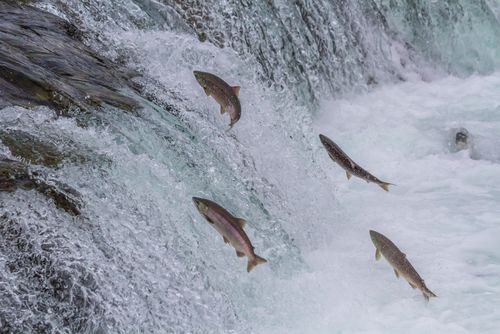Alaskan Salmon Uncontaminated By Fukushima Radiation, As FDA Continues To Monitor Situation

Testing conducted by the Food and Drug Administration (FDA) found Alaskan seafood remains safe to eat, as it has not yet been contaminated by radiation, which continues to leak from the Fukushima Daiichi nuclear power plant in Japan. “Our Radioactive Ocean,” a citizen science project organized by the Woods Hole Oceanographic Institution (WHOI), has confirmed the FDA’s results, finding seawater samples taken from the Pacific Coast contain the same levels of radiation — between 1 and 2 Bequerels of cesium-137 per cubic meter — evident in the ocean before the accident at Fukushima Daiichi in 2011. The existing cesium-137 levels, which are said to be harmless, are remainders of the U.S. government’s nuclear weapons testing programs from the 1940s and 50s.
Although the all-clear bell has been sounded for now, scientists expect cesium isotopes to reach American coastal waters later in 2014, when levels are predicted to increase over the coming two to three years. On March 11, 2011, one of the largest earthquakes ever recorded — a magnitude 9.0 — occurred off the coast of Japan, creating a series of tsunamis that swept ashore and caused devastation. Both the earthquake and resulting tsunamis badly damaged the Fukushima Daiichi nuclear power plant, creating a meltdown and causing four of its six reactors to release radiation into the atmosphere and the ocean.
Since this ongoing tragedy began, the FDA has been monitoring environmental conditions along the Pacific coast of the U.S. Alaskans, though, recently insisted on state-specific sampling data — such were their fears for the environment and their seafood. Working with the FDA, Alaska’s Department of Environmental Conservation (DEC) helped develop a sampling plan to analyze several Alaska fish species that are known to migrate from the western Pacific Ocean and that are harvested by commercial, recreational and subsistence fishers. Samples were collected across the state from the Aleutian Islands/Bering Sea to Southeast Alaska. “The data reassures us and other Alaskans for whom seafood is such a critical part of life in Alaska,” said Elaine Busse Floyd, a director of DEC.
Alaska’s DEC has requested the FDA continue to conduct testing for radiation in several fish species that will be collected from Alaska waters this spring and summer. Additionally, the WHOI plans to conduct four more tests for radioisotopes in water collected from the Gulf of Alaska during 2014. Ken Buesseler, an oceanographer at WHOI who previously studied the spread of radionuclides from Chernobyl in the Black Sea, organized the first comprehensive, international expedition to study the spread of radionuclides from Fukushima into the Pacific. The WHOI is a private research facility founded in 1930, located in Massachusetts, and primarily funded by the National Science Foundation and other government agencies.



























